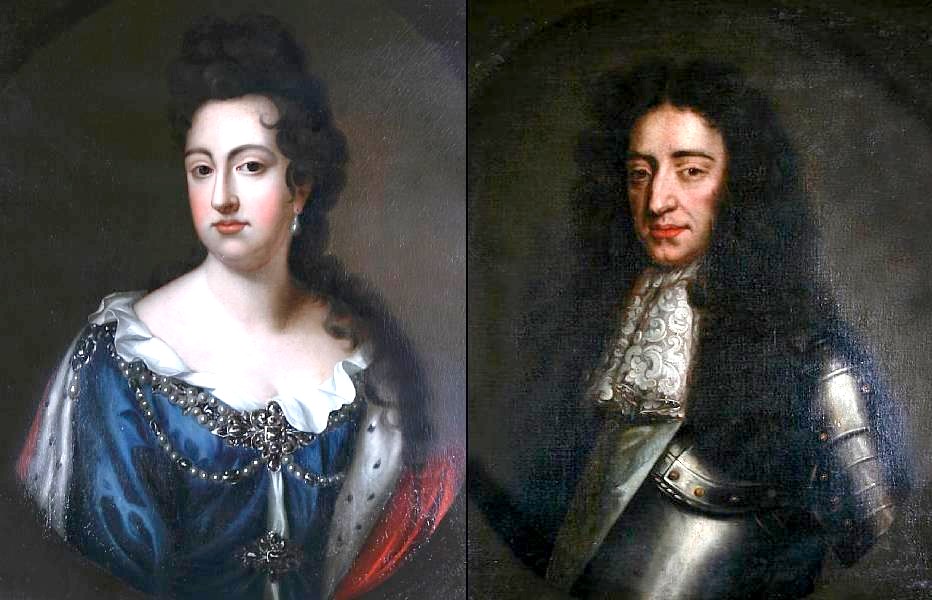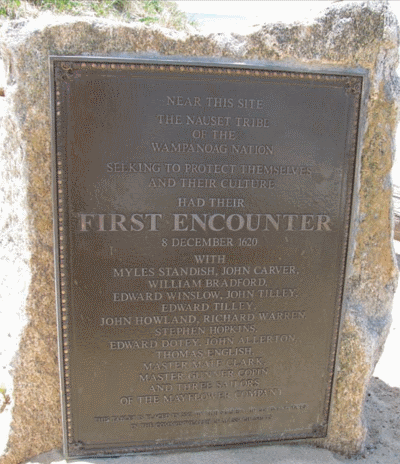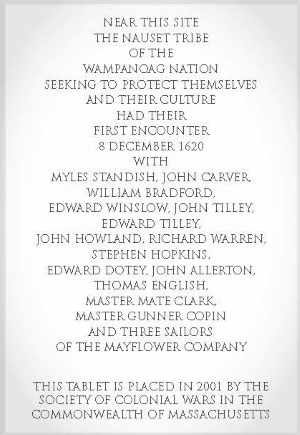The Society takes pride in a long record of activities furthering the study, interpretation, and preservation of our colonial past and making it available to the public. Our focus on education — through monuments, publications, speeches, and charitable and educational awards — has characterized the Society since its start. We began in 1895 by awarding prizes to school children for the best essays on colonial history.
Research and Publications

Joint rulers William and Mary, noticing the growing independence of the Massachusetts Bay Colony, appointed a Royal Governor in 1692 to keep the colonists in line
In its early years, the Society sponsored an active publications program, issuing some twenty volumes of scholarly and antiquarian articles, transcribed colonial documents, and genealogical charts. Later, in the 1970s, the Society co-published with the New England Historic Genealogical Society a series of volumes listing thousands of seventeenth- and eighteenth-century records of military service by Massachusetts colonists. These are now available digitally on their website. Some of our publication are listed below along with publications created jointly with the General Society of Colonial Wars.
- General Society of Colonial Wars. Honoring our Colonial History: To Members Past and Present of the Committees on Tablets and Monuments of the General Society and the State Societies. Charleston, SC: Advantage Press, 2011.
- General Society of Colonial Wars. Society of Colonial Wars 1892-1967 Seventy-fifth Anniversary. Philadelphia, PA: Winchell Company, 1967.
- General Society of Colonial Wars. The Centennial History 1892-1992, Vol. 43, No. 1. Philadelphia, PA: The Winchell Company, 1992.
- Johnston, Christopher, ed. Genealogies of the members and record of services of ancestors. Boston, MA: Society of Colonial Wars in the Commonwealth of Massachusetts, 1940.
- Society of Colonial Wars in the Commonwealth of Massachusetts. A letter from the Council of the colony of Massachusetts Bay to the Council of the colony of Connecticut, written April 7, 1676. Boston, MA: Printed for the Society, 1921.
- Society of Colonial Wars in the Commonwealth of Massachusetts. Colonial Wars: A Quarterly Magazine, Nos. 1-10. Boston, MA: Printed for the Society, 1903-1914.
- Society of Colonial Wars in the Commonwealth of Massachusetts. Forefathers’ day, 21 Dec. 1894: second general court of the Society of Colonial Wars in the Commonwealth of Massachusetts, held at Boston. Boston, MA: Bartholomew Green and John Allen, 1894.
- Society of Colonial Wars in the Commonwealth of Massachusetts. Proceedings of the First General Court of the Society of Colonial Wars in the Commonwealth of Massachusetts at Boston, December 21, 1893 including the address of the Rev. George M. Bodge on the Great Narragansett Fight of December 19, 1675. Boston, MA: Printed for the Society, 1894.
- Society of Colonial Wars in the Commonwealth of Massachusetts. Proceedings of the Special Courts and Second General Court. Boston, MA: Printed for the Society, 1894.
- Society of Colonial Wars in the Commonwealth of Massachusetts. The First Half Century of the Society of Colonial Wars in the Commonwealth of Massachusetts 1893-1943. Boston, MA: Printed for the Society, 1944.
- Whiton, Louis C., ed. Massachusetts muster rolls based on the holding of the Society of Colonial Wars in the State of New York. Boston, MA: Printed for the Society, 1899.
In 2019, the Society returned to its roots as a patron of historical research by commissioning a original research paper for the first time in decades, the publication of which it is hoped will launch a new series of historical essays. And, after a long hiatus, the Warriors Magazine was relaunched as a biannual bulletin with a fresh, appealing new design.
Placement of Historical Markers
During its first decades of activity, the Society placed a number of markers commemorating Massachusetts’ colonial sites of historical state5. Among these are a 1905 tablet in the town of Greenfield commemorating the service of Captain William Turner and his men during King Philip’s War; a 1912 plaque at Harvard College explaining the significance of the “Louisbourg Cross”-a relic taken following the 1745 conquest of that French colonial stronghold; and, not to neglect the Society’s convivial aspect, a 1924 tablet marking the site of Boston’s first tavern. (Neither of these last two markers are presently on public display.) More recently, in 2001, the Society placed at Eastham a tablet commemorating the Pilgrims’ 1620 “First Encounter” with North America’s indigenous peoples. These efforts were recognized in Honoring Our Colonial History, Tablets, Monuments and Memorials Placed by the Society of Colonial Wars, 1892-2010, as produced by George Brailsford, Andrew Huston, and others of the General Society’s Tablets and Monuments Committee in 2011.
Lovewell’s Fight (1904)


Monument marking the site of Lovewell’s Fight and honoring the memories of fifteen Massachusetts Rangers
Located on the shore of Lovewell Pond in Fryeburg, Maine (once part of Massachusetts), this tablet marks the site of Lovewell’s Fight, and honors the memory of the Massachusetts Rangers who fought and died in the battle on May 8, 1725. The tablet, embedded in a large piece of granite, was dedicated by the society on June 17, 1904.
The raid on Fryeburg in 1724 was the final expedition of Captain John Lovewell and his men in Dummer’s War, also known as the Wabanaki-New England War of 1722-1725 (or Lovewell’s War). The war was a series of battles across northern New England and Nova Scotia between the British and the Wabanaki Confederation in alliance with New France.
In the raid, Lovewell and his force of about forty-five men departed Dunstable on April 16 to build a fort in Ossippee and then raid the Abenaki town of Peaked. On May 9, while the Rangers were being led in prayer by their Chaplain, Jonathan Frye, the Rangers sighted an Abenaki warrior and fired up him. The warrior returned fire killing Captain Lovewell. Ensign Seth Wyman, second in command, killed the warrior. Chaplain Frye then scalped him.
Later that day, Chief Paugus and a war party ambushed the Rangers and a ten-hour battle ensued. Chief Paugus was eventually killed, after which the Indians abandoned the fight and fled to Canada. Twelve Massachusetts Rangers perished during the battle. Three died later and nine more were wounded.
Lovewell’s Fight has been remembered in ballads, poems and stories, including the first published poem of Henry Wadsworth Longfellow at age thirteen in, The Battle of Lovell’s Pond, The poem ends with the lines: “They are dead; but they live in each Patriot’s breast, And their names are engraved on honor’s bright crest. And on this tablet as well.”
Settlement of Weymouth and Miles Standish (1923)


Memorial stone erected in 1998 to replace the original 1923 tablet.
On June 14, 1923, as a part of Weymouth’s Tercentenary celebration, the society dedicated a tablet commemorating that anniversary of the town’s first settlers under the leadership of Miles Standish. William Howard Taft, Chief Justice of the Supreme Court and former President of the United States, attended the ceremony where Mrs. Taft unveiled the tablet. The tablet was embedded in a bolder at the foot of the flagstaff on Great Hill in Weymouth. In 1998, the tablet disappeared and was replaced with an engraved memorial-stone with an inscription identical to the original.
The tablet honors Miles Standish’s defense of the Weston Colony (Wessagusset Colony) against the Wampanog indian tribe. Upon hearing of Chief Massasoit plans to eradicate Weston’s settlement and proceed into Plymouth in 1634, Standish and two other men marched to Messages and preemptively killed the Indian leaders Wideawake and Pictou. The Indian raid never took place and disaster was averted. This action saved the ill-fated colonists who suffered from starvation and very poor relations with the neighboring Indians. (The colonists were accused of stealing food and of mistreating Indian women.)
Years after 1634, what was thought to be the remains of the two Indian leaders were discovered, and buried at Weymouth’s Old North Cemetery.
First Encounter (2001)


Tablet on First Encounter Beach in Eastham
On December 8, 1620, while exploring the beach north of the mouth of the Herring River in present-day Eastham on the Bay of Cape Cod, members of the Mayflower Company first encountered the native tribesmen. The event is recounted in Mourt’s Relation thus: “Anon, all upon a sudden, we heard a great and strange cry, which we knew to be the same voices, though they varied their notes. One of our company, being abroad, came running in and cried, “They are men! Indians! Indians!” and withal, their arrows came flying amongst us.”
In commemoration of this first encounter with warriors of the Wampanoag Nation, the Society of Colonial Wars in the Commonwealth of Massachusetts in 2001 erected a tablet on First Encounter Beach in Eastham, as below.
An earlier tablet commemorating the First Encounter on First Encounter Beach was placed by the Provincetown Tercentenary Commission in 1920. It is similar to the society’s, except that its initial words approach the encounter from a somewhat different perspective: “On this spot hostile Indians had their first encounter December 8, 1620 with…”. Every tablet is a reflection of the era in which it was created, and the these two tablets illustrate that point well.
The tablet placed by the Massachusetts Society in 2001 was originally mounted on a wooden stand. To ensure greater permanence, the tablet was removed from the stand and affixed to a large piece of stone.
Grantmaking
The Society has a long tradition of supporting historic sites and activities relevant to its mission. Recent grantees have included the Massachusetts chapter of the Society of The Colonial Dames, the Shirley-Eustis House Association, the Marblehead Museum (for the Jeremiah Lee mansion) and Plimoth Plantation. Applications are accepted in the fall of the year — awards are made in the spring.
Bostonian Society
Fort Ticonderoga
Historic Deerfield
Loring-Greenough House (Jamaica Plain)
Marblehead Architecture Heritage
Marblehead Museum and Historical Society
Massachusetts Society of Colonial Dames
National Society of Colonial Dames of Massachusetts
Norman B. Leventhal Map Center (Boston Library)
Paul Revere House
Pilgrim Hall Museum
Plimoth Plantation
Royall House and Slave Quarters (Medford)
Shirley-Eustis House
Wayside Inn
Wenham Museum
White-Ellery House (Gloucester)
Worcester Revolution of 1774
In 2019-20, the Society resumed another philanthropic initiative closely tied to its mission: the funding of graduate and senior undergraduate research fellowships, presently through the vehicle of the General Society’s Samuel Victor Constant program.
Commemorations
In the early 1990s, the Society spearheaded efforts to commemorate the 250th anniversary of the conquest of Louisbourg with the special exhibition Siege at Louisbourg, 1745: New England and the Struggle for World Empire. Displayed in National Park Service gallery space at the Charlestown Navy Yard, the exhibition was viewed by nearly 50,000 visitors during its run. Some two decades later, the Society helped initiate efforts to mark the 250th anniversary of the 1763 Paris accord formally ending the “French and Indian” or Seven Years War in North America. This centered on the display, in Boston’s Old State House museum, of an original signed copy of the 1763 Paris treaty document for several months during the anniversary year of 2013.
Most recently, the Society has vigorously supported the 400th anniversary of the Pilgrim landing on our shores with contributions toward the restoration of Mayflower II totaling approximately $50,000, a sum that leveraged an additional $25,000 in General Society matching funds.
Lectures
From September to May, mid-day meetings are held on the third Thursday of the month (except December) and include a lecture on an historical subject or other topic of interest. The number of Business Courts the Society has held from its founding to the end of calendar year 2014 was in the vicinity of 750. Please see this page for a list of the lectures given at the luncheons of the society since 2008.
